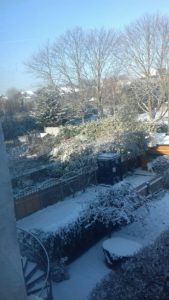‘Plague’ On sale now £9.99
Tags
Follow J.J.Anderson on Facebook
Follow J.J.Anderson on Pinterest
Archives
-
Recent Posts
Categories
http://www.thestorybazaar.com/rss.xml
Social
-
Privacy & Cookies: This site uses cookies. By continuing to use this website, you agree to their use.
To find out more, including how to control cookies, see here: Cookie Policy
A feast for the imagination


 RSS – Posts
RSS – Posts
Snow Beast
The Siberian wind, the so-called ‘beast from the east’ is roaring across Britain bringing snow and bitter cold. Quite where this nomenclature came from I don’t know and, ordinarily, I recoil from such. But this has given rise to one of the funniest and cleverest threads on twitter recently, thanks to Tom Pride (writer, satirist, blogger) who operates the Pride’s Purge web-site.
I don’t know and, ordinarily, I recoil from such. But this has given rise to one of the funniest and cleverest threads on twitter recently, thanks to Tom Pride (writer, satirist, blogger) who operates the Pride’s Purge web-site.
If you haven’t seen it already, using the hashtag #BeastFromTheEast it goes like this.
BREAKING NEWS: Boris Johnson claims snow from Eastern Europe will not be allowed to settle in Britain after Brexit.
BREAKING NEWS: Shock as figures reveal that 52% of voters believe him. More soon….
BREAKING: Theresa May and Boris Johnson in spat over post-Brexit plan for preventing snow from settling in Britain. More soon …
BREAKING: Nigel Farage claims Theresa May has “caved in” to EU demands over free movement of snow into Britain. More soon …
BREAKING: Outrage after EU Chief negotiator claims Theresa May is in “cloud cuckoo land” over UK demands to prevent snow settling in Britain after Brexit. More soon …
BREAKING: US President Donald Trump says Britain should build giant wall to stop foreign snow entering UK. More soon …
BREAKING: Katie Hopkins tells US talkshow there are no-go zones in UK cities after government allowed hordes of snowflakes to enter Britain unchecked. More soon …
BREAKING: Widespread disbelief after UK police claim #TheBeastfromTheEast now causing widespread disruption to Britain is not Muslim. More soon …
Famously it was said that Eskimo languages had far more words for ‘snow’ than English¹ did. This was in support of the idea of linguistic relativity, that a person’s surroundings and circumstances shape their vocabulary. An example now largely discredited, but I wonder if the theorists took into account all the old English country words for snow and ice, like rime and frore (meaning ‘frozen’ East Sussex), pitch (meaning accumulated snow, SW England), straik (meaning snow sufficient to reach fence tops, Scotland). Then there are the words categorising types of snowflake, like graupel and firn. One doesn’t need to delve too deeply to find a host of unusual nouns.
Even the more usual ones have new meanings, ‘snowflake’ now being a term of disdainful abuse, often for young people deemed too tender and precious e.g. ‘generation snowflake’. Wasn’t it ever thus? In the 1970s a ‘snowflake’ was an insulting way to describe a non-white person suggesting he or she had betrayed their ethnic roots and was pretending to be white in cultural and personal attitudes.
and personal attitudes.
I prefer to think of Leibnitz’ Law, the metaphysical principle that no two distinct things, like snowflakes, can be identical. Uniqueness is a good thing, though mapping the human genome has shown us that what we have in common hugely outweighs our differences.
I write this post before I go to southern Spain for the Festival de Jerez, where, I hope, no beast, of snow or otherwise, encroaches upon the fine music. Even if it did, its savage breast would, no doubt, be soothed.
If you enjoyed this article you might also enjoy Rain Rainy Season Weatherland
¹The Handbook of American Indian Languages, Franz Boas (1911)
Incidentally, for those of you who have asked where ‘Let me be clear…’ has gone. I have abandoned this series, as Leave Watch is doing it much better.
Share this:
Posted on 3rd March 2018 by juliej Leave a comment
This entry was posted in Political comment, Writing and tagged Political comment, Words. Bookmark the permalink.